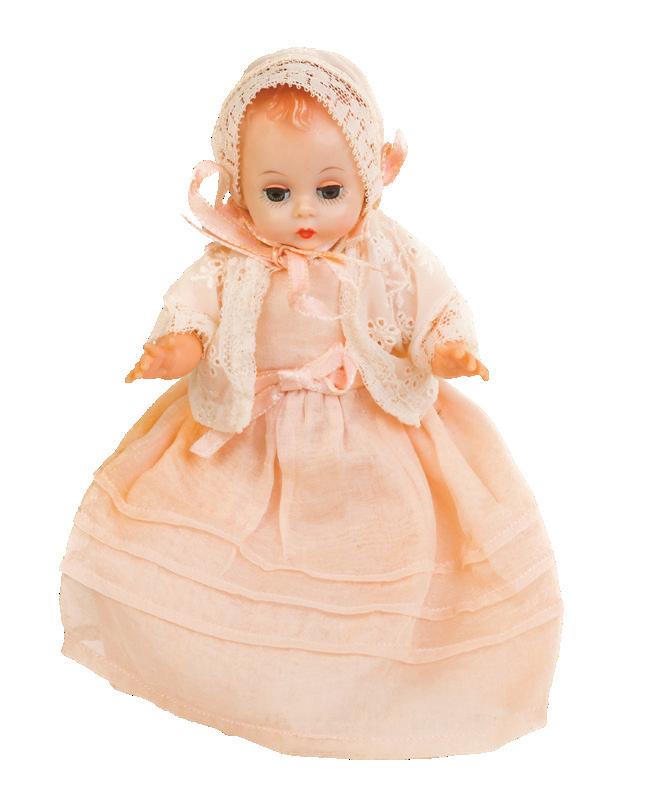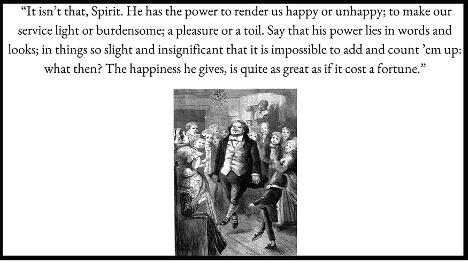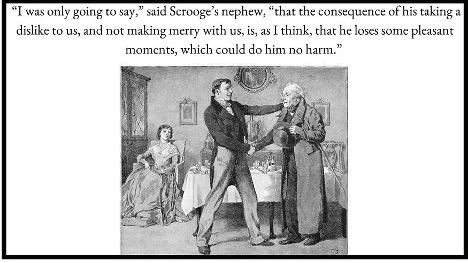

Merry

I can’t believe it’s that time of the year again! Is it me, or is time accelerating?
Seems like yesterday that I was just perusing the online for Christmas related content for last year’s supplement, and here I am again letting my fingers do the walking through endless pages of stories that Mr. Google has to offer.
Hopefully we are bringing you some possibly new, poignant, funny, sentimental, entertaining or otherwise amusing Christmas content to while away some relaxing time during the holidays.
Leave it on the coffee table; there’s always a few minutes now and then to pick it up and get nostalgic.
Christmas only comes around once a year so indulge yourself! At least it’s not fattening.
I must admit, putting this section together each year is one of my most favourite work-related duties. It takes hours of reading to find something that fits the bill for all tastes, but as Christmas is my favourite time of the year, it gives me a chance to get into the spirit of the season too.
I will admit, I do put a lot of pressure on myself to do more than what is humanly possible to do but, nevertheless, Christmas will soon be here and gone again for another year. My hope is that the real Spirit of Christmas will make a presence in your life and reveal the special gift God gave to the world in the birth of His son Jesus. This year, may God surround you and envelop you in His love and here’s hoping that 2025 will be full of blessings and may the Spirit of Christmas be with you all year long!
Merry Christmas!








Joan Ritchie EDITOR
A little girl full of wide-eyed wonder
Christmas was only a few days away, but five-year-old Joan was eager with excitement for Santa to come. She didn’t have a big list, in fact I am not sure she even had a list at all, but one thing I do know for sure is that she was yearning for something special.
Three kids, from three years to five, nearly wore out the pages of the Eatons and Sears catalogues dreaming of what Santa might bring. Christmas expectations were high, but in reality, money was tight for this young family.
It was Christmas Eve and one of their father’s red-trimmed wool socks hung on the bedpost at the end of each of their beds. Of course, the socks were the long ones so that Santa couldn’t miss them, and there were hopes he would load them up with the special treats he brought good boys and girls.
Night prayers were said while mom tucked the little ones in…and then the sandman dropped by and worked his magic. In Scandivian folklore, the sandman is said to sprinkle sand or dust on or into the eyes of


children at night to bring on sleep and dreams.
And as all parents know, sleep doesn’t come easy to children on Christmas Eve…and in the wee hours of the night, this little girl awoke. By the look of the stocking hung at the end of the bed bulging with an orange, hard candy and nuts, it was apparent
that Santa had indeed dropped by. Hurriedly she scurried to the living room to check if Santa had possibly brought a gift too, something special for her, her sister and brother. The tree glistened brilliantly and illuminated the room enough so that there was no need for more light.
Christmas magic was in the air!
There to her wonder stood the most beautiful walking doll she had ever seen, peering through the branches of the Christmas tree waiting to be adored by a little girl. She had beautiful long blonde hair, a very pretty dress and even a special necklace hand-crafted for her alone, and somehow Joan knew that this beauty was for her.
Needless to say, she squealed with glee and raced to the bedroom to arouse the others to seek out their Christmas treasures too. There is no memory of what the other kids found under the tree, but all I know is that it was the most magnificent gift for a young girl to get and a memory to be cherished.
Yes, it’s me and I continue to dream back to that very day, whereas it was one of the very few memories engraved from my childhood years.
Joan Ritchie
Editor
Moose Jaw Express





THE CHRISTMAS STORY
The Birth of Jesus
2 In those days Caesar Augustus issued a decree that a census should be taken of the entire Roman world. 2 (This was the first census that took place while[a] Quirinius was governor of Syria.) 3 And everyone went to their own town to register.
4 So Joseph also went up from the town of Nazareth in Galilee to Judea, to Bethlehem the town of David, because he belonged to the house and line of David. 5 He went there to register with Mary, who was pledged to be married to him and was expecting a child. 6 While they were there, the time
came for the baby to be born, 7 and she gave birth to her firstborn, a son. She wrapped him in cloths and placed him in a manger, because there was no guest room available for them.
8 And there were shepherds living out in the fields nearby, keeping watch over their flocks at night. 9 An angel of the Lord appeared to them, and the glory of the Lord shone around them, and they were terrified. 10 But the angel said to them, “Do not be afraid. I bring you good news that will cause great joy for all the people. 11 Today in the town of David a Savior has been born to you; he is the Messiah, the Lord. 12 This will be a sign to you: You will find a baby wrapped in cloths and lying in a manger.”
13 Suddenly a great company of the heavenly host appeared with the angel, praising God and saying, 14 “Glory to God in the highest heaven, and on earth peace to those on whom his favor rests.”
15 When the angels had left them and gone into heaven, the shepherds said to one another, “Let’s go to Bethlehem and see this thing that has happened, which the Lord has told us about.”
16 So they hurried off and found Mary and Joseph, and the baby, who was lying in the manger. 17
When they had seen him, they spread the word concerning what had been told them about this child, 18 and all who heard it were amazed at what the shepherds said to them. 19 But Mary treasured up all these things and pondered them in her heart. 20 The shepherds returned, glorifying and praising God for all the things they had heard and seen, which were just as they had been told.










Blacky Jakes: The Winter Crow
There was a crippled crow Who ended up in the cold snow. To the south he could not fly It made me just want to cry. You see he had a broken wing It was the saddest thing. But he was quite the overcomer In this land without the summer. Crow makes his home up in a tree And from our window we can see. That he would flip and he would flap And get around just like that. The neighbors we all get together To feed the bird with broken feather. We feed him with a little kibble
But you will never hear him quibble. He eats it all with so much glee Sitting high within that tree. Blacky Jakes is what I call him Sitting on that tall green column. And now you know the full story And I give God all the glory. Who made Blacky Jakes quite the crow In his home among the snow. The weather has been frightful But in the tree he feels delightful. Wind or snow or so much sleet
Surviving has been quite a feat. But every morning without fail I see him afore I get the mail. He makes me laugh, he makes me say Oh, it’s gonna be a great day....

Submitted by Pat Kusch
Blacky’s Story
I first noticed blacky about a month ago. His friends and family had all gone south, but here was Blacky flapping around and dragging his wing. I thought this bird will soon be a victim of winter or predators but through two blizzards later and very cold weather he has survived so far. He somehow climbs trees and can be seen hopping on the snowcovered ground. The neighbors and I all cheer him and are cheered by him and his tenacity. He battles the magpies for the kibble but seems to get enough to get by. One day his handicap may get the better of him, but until then we hope he survives the cruel winter to see his family and friends again in the spring.
P.S. I never thought I could like a crow so much.


Merry Christmas! Thank you for 38 Years of Giving
C hris tm as is the season for g iving and the M oose Jaw H ealth F oundation would like to thank it s m any donors and volunteers who contributed to helping save lives at the
Dr. F.H. Wigmore Regional Hospital.
Many individuals, businesses and organizations in Moose Jaw made generous donations to equip our regional hospital with state-of-the-art equipment. Your donations have saved and enhanced lives.

Thanks to the generosity and support of donors and volunteers over the last 38 years the Foundation has raised more than $39 million dollars to help dedicated health care professionals save lives. This was only made possible by your support.

Holiday Wishes from e Moose Jaw & Dis ict Chamber of Commerce
We are sending our warmest holiday wishes your way. Thank you for supporting local and may the holiday season bring your good cheer and health throughout the coming year. Merry Christmas and a happy New Year from all of us at the Moose Jaw & District Chamber of Commerce!
Cheers, Rob Clark, CEO of the Moose Jaw & District Chamber of Commerce

In the spirit of the holidays, please consider making a donation to help us continue to save lives. Every donation makes a difference.
F or m ore inform ation on donating to the F oundation, please vi sit mjhf.org or c all the F oundation at 306.694.0373.
Please consider including the Moose Jaw Health Foundation in your estate plan.
M erry C hris tm as and a healthy New Y ear!



Merry Christmas and Happy New Year

Top Five Christmas Stories With A Moral
by Jenna Kimble
Start a new tradition this year as you trifle through the treats and tinsel. Grab some of these stories and read along with your child as you soak up the vacation days December offers. This holiday is always so much more than it seems, so make this year your most meaningful yet. Try to find love in everything you do.
1. The Grinch
Dr. Seuss’s classic tale of the grumpy man in the mountain above Whoville will tug at your heart and teach children the true meaning of Christmas. As the Whos in Whoville become caught up in the commercialismofChristmas time, the Grinch hatches a plan to put a reality check on the entire town on Christmas Eve. After stealing all of the town’s presents, and before he is about to drop them off the mountain, the Grinch remembers the warmth of young Cindy Lou Who. She teaches him the beauty of love and charity. The happy ending promotes the true meaning behind Christmas: that “maybe Christmas, perhaps, doesn’t come from a store.”
2. A Christmas Carol

Mean Mr. Scrooge is a must-read on your list of bedtime or family stories. After living a hard, lonely life wealthy Scrooge is visited by three

ghosts and faces the fearful facts about his future. With no close family or friends, Scrooge’s visions and encounters with the Spirits remind him of the person he once was and the person he still can be. Life lesson? “I will honour Christmas in my heart, and try to keep it all the year. I will live in the Past, the Present, and the Future.”

3. The Polar Express
Yes, watch the movie, but don’t forget to read the book and admire the beautiful artwork. Make one of those cardboard trains if you’re feeling adventurous! The Polar Express takes you on a midnight train ride filled with children heading towards the North Pole. Santa gives the first gift of Christmas - a silver bell - to a young boy,
who learns how to believe. This is a heartwarming movie with a sweet lesson on the magic of Christmas.
4. Jingle All the Way
Yes, we know it may seem out of place, and Arnold isn’t exactly magical, but this Christmas lesson is for parents. Whether it’s Turbo Man, Barbie, or Mr. Potato Head, plan ahead and don’t be the frantic fool searching seven stores on Christmas Eve.

5. The Nativity
Perhaps the most meaningful story, it’s the reason we celebrate Christmas. Retell the story of Mary and Joseph in your home or act it out with each child taking a part. This lesson is one I am still learning. It’s a lesson of ultimate love, gratitude, humility, and sacrifice.
https://www.familytoday.com/family/top5-christmas-stories-and-morals/





A Brother Like That
A friend of mine named Paul re ceived a new car from his brother as a pre-Christmas present.
On Christmas Eve, when Paul came out of his office, a street urchin was walking around the shiny new car, admiring it.
“Is this your car, mister?” he asked. Paul nodded. “My brother gave it to me for Christmas.”
The boy looked astounded. “You mean your brother gave it to you, and it didn’t cost you anything? Gosh, I wish…..”
He hesitated, and Paul knew what he was going to wish. He was going to wish he had a brother like that. But what the lad said jarred Paul all the way down to his heels.

“I wish,” the boy went on, “that I could be a brother like that.”
Paul looked at the boy in astonishment, then impulsively added, “Would you like a ride in my new car?”
“Oh, yes, I’d love that!”
After a short ride the urchin turned, and with his eyes aglow said, “Mister, would you mind driving
front of my house?”
Paul smiled a little. He thought he knew what the lad wanted. He wanted to show his neighbors that he could ride home in a big automobile. But Paul was wrong again.
“Will you stop right where those steps are?” the boy asked.
He ran up the steps. Then in a little while, Paul heard him coming back, but he was not coming


unknown author
fast. He was carrying his little polio crippled brother. He sat down on the bottom step, then sort of squeezed up right against him and pointed to the car.
“There she is, Buddy, just like I told you upstairs. His brother gave it to him for Christmas and it didn’t cost him a cent, and someday I’m gonna give you one just like it; then you can see for yourself all the pretty things in the Christmas windows that I’ve been trying to tell you about.”
Paul got out and lifted the little lad into the front seat of his car. The shining-eyed older brother climbed in beside him and the three of them began a memorable holiday ride.
That Christmas Eve, Paul learned what Jesus meant when He said,” It is more blessed to give…..”
https://christmasstories.org/wp-content/ uploads/2022/11/25-days-of-christmas-stories. pdf




The Journey of the Magi (1927)
“A cold coming we had of it, Just the worst time of the year For a journey, and such a long journey: The ways deep and the weather sharp, The very dead of winter.”
And the camels galled, sore-footed, refractory,
Lying down in the melting snow. There were times we regretted The summer palaces on slopes, the terraces, And the silken girls bringing sherbet. Then the camel men cursing and grumbling And running away, and wanting their liquor and women,
And the night-fires going out, and the lack of shelters,
And the cities hostile and the towns unfriendly
And the villages dirty and charging high prices:
A hard time we had of it.
At the end we preferred to travel all night, Sleeping in snatches,
With the voices singing in our ears, saying That this was all folly.

Then at dawn we came down to a temperate valley, Wet, below the snow line, smelling of vegetation; With a running stream and a water-mill beating the darkness,
And three trees on the low sky,
And an old white horse galloped away in the meadow. Then we came to a tavern with vine-leaves over the lintel,
Six hands at an open door dicing for pieces of silver, And feet kicking the empty wine-skins.
But there was no information, and so we continued And arriving at evening, not a moment too soon Finding the place; it was (you may say) satisfactory. All this was a long time ago, I remember, And I would do it again, but set down This set down
This: were we led all that way for Birth or Death? There was a birth, certainly, We had evidence and no doubt. I had seen birth and death, But had thought they were different; this Birth was Hard and bitter agony for us, like Death, our death. We returned to our places, these Kingdoms, But no longer at ease here, in the old dispensation, With an alien people clutching their gods.

by T.S. Elliot
I should be glad of another death. Poem © byTS Eliot from Collected Poems 1909-1962, published by Faber and Faber Ltd (2002). Reproduced with permission from Faber and Faber Ltd.
SIDEBAR
T.S. Eliot’s dramatic monologue focuses upon the famous biblical story of the three kings from the East travelling to Bethlehem to pay homage to the baby Jesus. He imagines one of the kings giving an account of the journey.
Within the Christian tradition, the journey of the Magi is associated with celebration and wonder and gifts of gold, frankincense and myrrh. However, this seems like an arduous journey. What details in the first twenty lines suggest that the kings had ‘a hard time’ of it?
In lines twenty-one to thirty-one, they arrive at their destination. Given what we know of the life and death of Christ, what is the significance of some of the images in this section, such as ‘the three trees on the low sky’ and the hands ‘dicing for pieces of silver’?
In the last twelve lines we learn that the kings were deeply affected and changed by their experience. The birth of Christ heralds the start of a new order and new truth, and yet the kings have to return to their kingdoms and to ‘an alien people clutching their gods’.
https://www.poetrybyheart.org.uk/poems/thejourney-of-the-magi























































































































Gentle Mary Laid Her Child
In the October 8, 1919 issue of the Canadian Methodist newspaper The Christian Guardian, the following announcement appeared under the heading “A Christmas Carol Contest.” “The Christian GuardianannouncesaChristmasCarolContestopen to anyone who cares to participate. This contest will be in two parts, the first part ending Tuesday, October 28th, which will be for verses only, and the second part ending Tuesday, November 25th, which will be for suitable musical settings of the prize poems among the verses submitted.”
The results of the poetic part of the contest were revealed in the November 5th issue of the newspaper, which pointed out how over 200 entries were received “from every province in the Dominion, but also from Newfoundland and three or four points in the United States.” The winning text was written by Rev. Joseph Simpson Cook (1859–1933) in five stanzas of 7676 hymnic meter. “Gentle Mary wrapped her child” was the opening line.
When the text received its first hymnal publication in The Hymnary of the United Church of Canada (1930), the line was revised to read “Gentle Mary laid her child.” Following one of the requirements of the newspaper contest, the original poem had been cast into five stanzas of four lines each, but in The Hymnary, the first four stanzas were combined into two eight-line strophes and a new quatrain was added to the original fifth stanza to form a final eight-line strophe, so the revised hymn consisted of three eight-line stanzas. Presumably, the revisions and extension of the text (which was probably done to fit the tune TEMPUS ADEST FLORIDUM) were by Cook himself as the preface indicated the hymn had been included gratis by his permission. This altered version became the
standard form of the hymn.
Rev. Cook used the term gentle to describe the mother of Jesus. Gentle implies being free from harshness, sternness, or violence and also soft and delicate.
When gentle entered the English language it described the ideal characteristics of aristocrats, as possessing higher qualities than ordinary folk. Those of aristocratic birth were to exhibit graciousness, courteousness, and kindness. Gentle derived from the Latin word gentilis, meaning of one’s own house, of good family or breeding.
Gentle is also related to the word Gentiles, the Latin translation of the Hebrew goy, meaning the nations, the other nations, non-Jews. Medieval Latin adjusted gentilis to describe non-Christians or pagans.
It is interesting that one of our popular Christmas carols describes Mary, the mother of Jesus, with a term that was originally associated with describing people who are different than the person’s own culture and society. Mary, the Mother of Our Lord, transcends all race distinctions and has been claimed by Christians and Jews alike.
Mary was truly gentle in the sense of aristocratic birth, as the Bible describes her as being a descendant of King David, of Biblical fame, and ancestor of the Messiah.
Rev. Simpson used gentle to describe Mary as a mother with qualities of a benign, delicate, mellow, mild, soft, soothing, and tender nature.
Benign implies a gracious disposition, showing kindness and gentleness. Delicate can mean generally pleasant. Mellow suggests friendly and agreeable. Mild implies calm in nature or behaviour. Soft suggests a person bringing ease, comfort, or
Me y Christmas a

by John Kreutzwieser
quietness to a situation. Soothing indicates a mother having a relaxing effect. Tender means marked by, responding to, or expressing fondness and love.
The angel Gabriel said to Mary, “Greetings, O favoured one, the Lord is with you! . . . Behold, you will conceive in your womb and bear a son, and you shall call his name Jesus. He will be great and will be called the Son of the Most High. And the Lord God will give to him the throne of his father David, and he will reign over the house of Jacob forever, and of his kingdom there will be no end.” (Luke 1:28, 30-33)
Gentle Mary laid her Child lowly in a manger; There He lay, the undefiled, to the world a stranger: Such a Babe in such a place, can He be the Savior? Ask the saved of all the race who have found His favor.
Angels sang about His birth; Wise Men sought and found Him;
Heaven’s star shone brightly forth, glory all around Him:
Shepherds saw the wondrous sight, heard the angels singing;
All the plains were lit that night, all the hills were ringing.
Gentle Mary laid her Child lowly in a manger; He is still the undefiled, but no more a stranger: Son of God, of humble birth, beautiful the story; Praise His name in all the earth, hail the King of glory!


Plum Pudding
Old-Fashioned Plum Pudding
By Lori Elliott
Made famous by Dickens’A Christmas Carol, old-fashioned plum pudding is one of those quintessential holiday desserts that will forever be associated with the Christmas season. For many of us, though, plum pudding is one of those holiday traditions that we see in holiday movies or read about in books but have never actually tasted ourselves.
“Plumless” Plum Pudding
And just like old-fashioned fruitcake, plum pudding is often misunderstood. (I know most people make fun of fruitcake, but if you try old recipes for it, it’s really quite delicious!) In the past I had always thought that plum pudding was made out of actual plums. But it turns out that there weren’t actually any plums in plum pudding at all!

As I learned from attending the Christmas by Candlelight program at Old Sturbridge Village in earlier centuries, the word “plum” referred to raisins or other fruits such as currants, and a plum pudding was simply a suet pudding made with a hefty amount of raisins and currants. In flavor, plum pudding is quite similar to traditional fruitcake with a blend of sweetness and spices and the slight tang of citrus flavors. The flavor is so similar to fruitcake that if you want an easier, more fail-proof version of a traditional holiday dessert, I recommend giving 19th century fruitcake a try.
The boiling part of the plum pudding can be a bit challenging, and it does take several hours of boiling. So, if you have the time and you want a more authentic Dicken’s-era plum pudding experience, then read on for the recipe, and if you want to try something that tastes very similar but is simpler and takes less time then the fruitcake recipe I linked to above is a good option.
Original Recipe
“One pound raisins, one pound currants, one pound suet, one pound flour, half pound citron, one nutmeg, one tablespoonful allspice, six eggs, one pound brown sugar, one wine-glass brandy; boil six hours.” -Mrs. Winslow’s Domestic Receipt Book for 1879, pg. 10
https://www.ourheritageofhealth.com/old-fashioned-plum-pudding/
Traditional Figgy Pudding (Christmas Pudding)
By Kimberly Killebrew
What is Figgy Pudding?
If you’re familiar with the figgy pudding Christmas carol, We Wish You a Merry Christmas, you may have asked yourself at some point, “what is a figgy pudding anyway?”
All three of these names refer to a traditional English steamed cake-like dessert comprised of breadcrumbs, flour, suet, sugar, eggs, brandy, lemon zest, candied citrus peel, spices, and dried fruits (specifically raisins, currants, and golden raisins). With respect to the different names, the short answer is that figgy pudding can be considered a much earlier precursor of plum pudding and they’ve both come to be referred to as Christmas pudding.
A thoroughly authentic Figgy Pudding recipe, also known as Christmas Pudding and Plum Pudding! It’s the perfect make-ahead dessert as the flavors only get better over time. A household favorite for centuries, no traditional Christmas is complete without a Figgy Pudding!
Ingredients (hint: no figs or plums)

Figgy pudding dates back to the 14th century and was a much different dish than what we refer to as figgy pudding today. It was more of a wet, sticky, thick porridge consisting of boiled figs, water, wine, ground almonds, raisins and honey. It later evolved into incorporating ground meat and grains and then later still evolved into a steamed pudding that was made with raisins.

Where does the term “plum” pudding come from? Plums were what the pre-Victorians called raisins, and dried fruits in general, and the name stuck. It wasn’t until 1845 when it first came to be called “Christmas Pudding” in Eliza Acton’s bestselling cookbook, Modern Cookery for Private Families.
And so we have three names that are still used in different regions of the English-speaking world. In the U.S. it is more commonly called Figgy Pudding whereas in the UK and Ireland it is more commonly known as Christmas Pudding (or simply “pud”), or Plum Pudding.
As with many traditional Christmas desserts, plum pudding incorporates symbolism reflective of Christ such as the holly (representing the crown of thorns) and setting the pudding on fire (representing the passion of Christ). https://www.daringgourmet.com/christmas-pudding/
Traditional Spotted Dick
By Kimberly Killebrew
A quintessential British dessert, Spotted Dick represents everything that







ted with succulent currants is drizzled with a luxuriously rich and creamy vanilla custard (recipe included). It’s pure heaven!
What is Spotted Dick?
“Spotted what?” I hear you. That’s the most common question from the snickering lips ofAmericans the first time they hear the name of this legendary British steamed pudding, Spotted Dick. I was among that giggling crowd when I first moved to England for a 7-year stint, being quite naive to British terminology beyond what I had picked up from my favorite older British sitcoms (e.g., Fawlty Towers, Black Adder, Monte Python, etc). And what’s interesting is that despite its immense popularity over the course of at least two centuries, time seems to have lost the origins of its quirky name.
What is the Origin of Spotted Dick?
While “spotted” seems simple enough (i.e., the “spots” throughout the pudding from the dried currants), “dick” is the more puzzling of the two terms. Was it referring to the nickname of someone named Richard? Some have wondered if comes from an old English corruption of the word pudding to “puddick.” But who knows? The mystery of Spotted Dick goes on.
The first known recorded recipe of Spotted Dick is found in the mid-19th century cookbook, The Modern Housewife or Ménagère, by Alexis Soyer, one of Britain’s first celebrity chefs who seems to imply that the pudding had already been around for some time.
In any case, Spotted Dick has remained high in popularity over the centuries to the extent that you can find if in tin cans, manufactured by Heinz, in every British grocery store. That was my first exposure to the stuff. I still remember going into a grocery store in England and picking up a can of Spotted Dick on the shelf and thinking “what IS this??” as I showed it to my mom and we both started giggling like school girls.
For my British friends who are wondering what the fuss is all about, you’ll have to Google the name for its anatomical reference to see what Americans find so amusing about it. To tell you myself would make me blush ;)
Three Ingredients for Making Proper Spotted Dick
Caster Sugar: Caster sugar is the form of sugar traditionally called for in Spotted Dick and most British baking. While very popular in the UK it’s virtually unheard of here in the U.S. And while it can be found in some gourmet specialty shops it’s very expensive, which is silly because all it is is finely ground granulated sugar. You can make it yourself simply by grinding regular granulated sugar in a coffee or spice grinder for a few seconds. That said, though caster sugar is the traditional choice it really isn’t necessary because after 90 minutes of steaming the sugar is going to completely dissolve, whether caster or granulated. So the choice is yours.
Dried Currants: Despite their name, dried currants aren’t actually currants at all, they are in fact a small variety of raisin known as zante raisins. They are widely used in British baking and are preferred over raisins in many baked goods, including Spotted Dick, because 1) they’re smaller, remain a bit firmer and don’t get mushy, and 2) instead of being overly sweet they have a slightly more tart flavor.
Shredded Suet: Every traditional recipe for Spotted Dick calls for it as do many other British pastries and pies, resulting in a superior texture. It can be difficult if not near impossible to find in many areas outside of Britain and in more modern times many people are replacing suet with butter anyway. Butter works just fine but the beef suet has definite advantages. Suet has a high melting point and so as the pudding cooks small pockets are formed


where the suet is slower to melt, resulting in a lighter, more spongy texture.
https://www.daringgourmet.com/traditional-spotted-dick-englishsteamed-currant-pudding-with-vanilla-custard/
Mom’s Christmas Pudding by Joan Ritchie
1 cup brown sugar
1 cup finely ground suet
3 eggs
3 Tbsp. molasses
Beat well until mixed.
4 cups mixed fruit - apples chopped, red and green maraschino cherries (not in liquid) raisins, currants, candied mixed fruit and even candied mixed peel if you want (sprinkle with a dusting of flour)
1/2 cup flour
2 tsp baking powder
1 small tsp soda
1/2 tsp salt
1/4 tsp cloves
1 tsp cinnamon
1/2 tsp nutmeg
Put all ingredients together.
Put in sterilized pint jars but only fill about 2/3 full because the cake expands when cooking.
Seal pints and put in a canner of boiling water with water about 1/2 way up the jars. Simmer for 3 hours on the stove.













After opening, steam the jar in a pot of boiling water for about an hour until hot through.
I serve it with rum sauce using spiced rum or rum flavouring. (This is a basic homemade caramel sauce recipe made from butter, brown sugar, a little bit of cream, the rum and if it needs thickening then use a small cornstarch slurry to add before thickening)

























































The Man Who Missed Christmas
It was Christmas Eve; and, as usual, George Mason was the last to leave the office. He walked over to a massive safe, spun the dials, swung the heavy door open. Making sure the door would not close behind him, he stepped inside.
A square of white cardboard was taped just above the topmost row of strongboxes. On the card a few words were written. George Mason stared at those words, remembering…..
Exactly one year ago he had entered this selfsame vault. And then, behind his back, slowly, noiselessly, the ponderous door swung shut. He was trapped—entombed in the sudden and terrifying dark. He hurled himself at the unyielding door, his hoarse cry sounding like an explosion. Through his mind flashed all the stories he had heard of men found suffocated in time vaults. No clock controlled this mechanism; the safe would remain locked until it was opened from the outside. Tomorrow morning.
Then realization hit him. No one would come tomorrow—tomorrow was Christmas.
Once more he flung himself at the door, shouting wildly, until he sank on his knees exhausted. Silence came, high-pitched, singing silence that seemed deafening. More than thirty-six hours would pass before anyone came—thirty-six hours in a steel box three feet wide, eight feet long, seven feet high. Would the oxygen last? Perspiring and breathing heavily, he felt his way around the floor. Then, in the far right-hand corner, just above the floor, he found a small circular opening. Quickly he thrust his finger into it and felt, faint but unmistakable, a cool current of air.
The tension release was so sudden that he burst into tears. But at last, he sat up. Surely he would not have to stay trapped for the full thirty-six hours. Somebody would miss him. But who? He was unmarried and lived alone. The maid who cleaned his apartment was just a servant; he had always treated her as such. He had been invited to spend Christmas Eve with his brother’s family; but the children got on his nerves and expected presents.
A friend had asked him to go to a home for elderly people on Christmas Day and play the piano— George Mason was a good musician. But he had made some excuse or other; he had intended to sit

at home, listening to some new recordings he was giving himself.
George Mason dug his nails into the palms of his hands until the pain balanced the misery in his mind. Nobody would come and let him out, nobody, nobody, nobody…
Miserably the whole of Christmas Day went by, and the succeeding night.
“To love people, to be indispensable somewhere, that is the purpose of life. That is the secret of happiness.”
On the morning after Christmas the head clerk came into the office at the usual time, opened the safe, then went on into his private office.
No one saw George Mason stagger out into the corridor, run to the water cooler, and drink great gulps of water. No one paid any attention to him as he left and took a taxi home.
Then he shaved, changed his wrinkled clothes, ate breakfast and returned to his office where his employees greeted him casually.
That day he met several acquaintances and talked to his own brother. Grimly, the truth closed in on George Mason. He had vanished from human society during the great festival of brotherhood; no one had missed him at all.

by J. Edgar Park
Reluctantly, George Mason began to think about the true meaning of Christmas. Was it possible that he had been blind all these years with selfishness, indifference, pride? Was not giving, after all, the essence of Christmas because it marked the time God gave His son to the world?
All through the year that followed, with little hesitant deeds of kindness, with small, unnoticed acts of unselfishness, George Mason tried to prepare himself….
Now, once more, it was Christmas Eve.
Slowly he backed out of the safe, closed it. He touched its grim steel face lightly, almost affectionately, and left the office.
There he goes now in his black overcoat and hat, the same George Mason as a year ago. Or it is? He walks a few blocks, then flags a taxi, anxious not to be late. His nephews are expecting him to help them trim the tree. Afterwards, he is taking his brother and his sister-in-law to a Christmas play. Why is he so happy? Why does this jostling against others, laden as he is with bundles, exhilarate and delight him?
Perhaps the card has something to do with it, the card he taped inside his office safe last New Years’ Day. On the card is written, in George Mason’s own hand:
“To love people, to be indispensable somewhere, that is the purpose of life. That is the secret of happiness.”
https://christmasstories.org/wp-content/ uploads/2022/11/25-days-of-christmas-stories. pdf




A Christmas Adventure
I remember my first Christmas adventure with Grandma. I was just a kid.
I remember tearing across town on my bike to visit her on the day my big sister dropped the bomb: “There is no Santa Claus,” she jeered. “Even dummies know that!”
My Grandma was not the gushy kind, never had been. I fled to her that day because I knew she would be straight with me. I knew Grandma always told the truth, and I knew that the truth always went down a whole lot easier when swallowed with one of her “world-famous” cinnamon buns. I knew they were world-famous, because Grandma said so. It had to be true.
Grandma was home, and the buns were still warm. Be tween bites, I told her every thing. She was ready for me. “No Santa Claus?” She snorted….”Ridiculous! Don’t believe it. That rumor has been goingaroundforyears,and it makes me mad, plain mad!! Now, put on your coat, and let’s go.”

“Go? Go where, Grandma?” I asked. I hadn’t even finished my second world-famous cinnamon bun.

“Where” turned out to be Kerby’s General Store, the one store in town that had a little bit of just about everything. As we walked through its doors, Grandma handed me ten dollars.
That was a bundle in those days. “Take this money,” she said, “and buy something for someone who needs it. I’ll wait for you in the car.” Then she turned and walked out of Kerby’s.
I was only eight years old. I’d often gone shopping with my mother, but never had I shopped for anything all by myself.
The store seemed big and crowded, full of people scrambling to finish their Christmas shopping. For a few moments I just stood there, confused, clutching that ten-dollar bill, wondering what to buy, and
who on earth to buy it for. I thought of everybody I knew: my family, my friends, my neighbors, the kids at school, and the people who went to my church.

I was just about thought out, when I suddenly thought of Bobby Decker. He was a kid with bad breath and messy hair, and he sat right behind me in Mrs. Pollock’s grade-two class.
Bobby Decker didn’t have a coat. I knew that because he never went out to recess during the winter. His mother always wrote a note, telling the teacher that he had a cough, but all we kids knew that Bobby Decker didn’t have a cough; he didn’t have a good coat. I fingered the ten-dollar bill with growing excitement. I would buy Bobby Decker a coat!
I settled on a red corduroy one that had a hood to it. It looked real warm, and he would like that. “Is this a Christmas present for someone?” the lady behind the counter asked kindly, as I laid my ten dollars down.


Author Unknown
needed a good winter coat. I didn’t get any change, but she put the coat in a bag, smiled again, and wished me a Merry Christmas.
That evening, Grandma helped me wrap the coat (a little tag fell out of the coat, and Grandma tucked it in her Bible) in Christmas paper and ribbons and wrote, “To Bobby, From Santa Claus” on it. Grandma said that Santa always insisted on secrecy. Then she drove me over to Bobby Decker’s house, explaining as we went that I was now and forever officially, one of Santa’s helpers.
Grandma parked down the street from Bobby’s house, and she and I crept noiselessly and hid in the bushes by his front walk.

Then Grandma gave me a nudge. “All right, Santa Claus,” she whispered, “get going.”
I took a deep breath, dashed for his front door, threw the present down on his step, pounded his door and flew back to the safety of the bushes and Grandma.
Together we waited breathlessly in the darkness for the front door to open. Finally it did, and there stood Bobby.
Fifty years haven’t dimmed the thrill of those moments spent shivering, beside my grandma, in Bobby Decker’s bushes.
That night, I realized that those awful rumors about Santa Claus were just what Grandma said they were – ridiculous. Santa was alive and well, and we were on his team. I still have the coat tag of $19.95.
May you always have LOVE to share, HEALTH to spare and FRIENDS that care…


I told her about how Bobby really
Twas The Night Before Christmas A Long Time Ago

‘Twas the first night of Christmas a long time ago, The hillside was peaceful, the moon was aglow.
The world couldn’t know from what happened before, That men would remember this night evermore.
The sheep on the hillside—their days journey over, Were dreaming sweet dreams of a field full of clover. The shepherds were watchful while guarding their flock, The earth was their pillow, the stars were their clock.
Then all of a sudden, they jumped at the sight
Of the sky all a blaze with a heavenly light. They huddled in fear, then they started to rise As the lightening-like flash tore open the skies.
The heavens were split by the silvery ray, The dark disappeared and the night became day. And lo, at the end of the rainbow of light Appeared then an angel to banish their fright.
The angel brought news of a birth in a manger And bade them to hasten to welcome the stranger. For Mary had just given birth to a boy Whose coming would bring so much comfort and joy.
A choir of angels looked down from the sky And heavenly voices were heard from on high: Peace be on earth and good will to all men.














The heavenly angels then faded from sight, The sky once again turned from day to night. The shepherds all quietly rose from the ground, And hurried to go where the child would be found.
As they reached Bethlehem and the inn was in sight From the barn came a trickle of half-hidden light. It led like a path to a soft little bed And shone very tenderly on a child’s head.
The child in the manger was sleeping so sound, His eyes were still closed, as the shepherds stood round. From that instant of grace on that night long ago Thousands of years would be warmed by the glow.
Guided by light from a bright shining star Came a pilgrimage led of three kings from afar. They were dressed in the finest of satins and lace, Their complexions were that of an Orient race.
The three wealthy kings were wise men and proud, But they went to the Christ child and solemnly bowed. They came bearing treasures of incense and gold To that sweet little child, still not very old.
The star in the sky twinkled down from above, The world was awakened to kindness and love. The past was forgotten, the future was bright, And the spirit of Christmas was born on that night.

https://christmasstories.org/wp-content/uploads/2022/11/25days-of-christmas-stories.pdf















Waiting…..Waiting for Christmas
Herman and I finally locked our store and dragged ourselves home. It was 11 p.m. Christmas Eve. We’d sold almost all of our toys; and all of the layaway, except one package, had been picked up. But the person who had put a dollar down on that package never appeared.
Early Christmas morning our 12-year-old son, Tom, Herman and I were out under the tree opening up gifts. But there was something humdrum about this Christmas. Tom was grown up, and I missed his childish exuberance of past years. As soon as breakfast was over, he left to visit friends and Herman disappeared into the bedroom, mumbling, “I’m going back to sleep.”
So there I was alone. It was nearly 9 a.m. Sleet mixed with snow cut the air outside. “Sure glad I don’t have to go out on a day like today,” I thought to myself. And then it began—something I’d never experienced before. A strange, persistent urge. “Go to the store,” it seemed to say. “That’s crazy,” I said to myself, “no one opens shop on Christmas day.” For an hour I fought that strange feeling. Finally, I could stand it no longer. I got dressed. I put on my wool coat, placed my hat on my head, then my galoshes, scarf and gloves. Once outside, the wind cut right through me and sleet stung my cheeks. I felt ridiculous. I had no business being out in the bitter chill.
There was the store just ahead. “But, what in the world?” I wondered.
In front of the store stood two little boys— huddled together, poorly dressed, and half frozen. One was about nine, the other six.
“Here she comes!” yelled the older one. “See, I told you she would come,” he said. The younger one’s face was wet with tears, but when he saw me his eyes opened wide and his sobbing stopped.
“What are you two children doing out here?” I scolded, hurrying them into the store.
“We’ve been waiting for you,” replied the older.
“My little brother Jimmy didn’t get any Christmas. We want to buy some skates. That’s what he wants.”
I looked at the three dollars in his hand and at their expectant faces. Then I looked around the store. “I’m sorry” I said, “but we have no ska….” Then my eye caught sight of the layaway shelf with its lone package. Could it be? I walked over and unwrapped the package. Miracles of miracles, there was a pair of skates!
Jimmy reached for them. “Lord,” I


unknown author
said silently, “let them be his size.” And miracle added upon miracle. They were his size. When the older boy finished tying the laces and saw that the skates fit perfectly, he stood up and presented the dollars to me.
“No, I’m not going to take your money,” I told him. “I want you to have these skates and use your money to get some gloves for your hands.” What I saw in Jimmy’s eyes was like a blessing. It was pure joy, and it was beautiful. My low spirits rose.
As I locked the door, I turned to the older brother and said, “How lucky that I happened to come along when I did. How did you boys know I would come?” I wasn’t prepared for his reply. His gaze was steady, and he answered me softly. “I knew you would come. I asked Jesus to send you.”
The tingles in my spine weren’t from the cold. I knew God had planned this.
As we waved good-bye, I returned home to a brighter Christmas than I had left.
https://christmasstories.org/wp-content/ uploads/2022/11/25-days-of-christmas-stories. pdf






The all-time greatest Christmas marketing story
Lauren is an adventurer and loves to save her money for international vacations. This year, she decided to go toAmsterdam, Belgium, and Germany to attend some of the winter Christmas markets. In Germany, she noticed that many festival stalls were selling glass pickles as a Christmas tree ornament. They were so prevalent that eventually she asked somebody what it meant.
Apparently, this “German tradition” started with an enterprising American sales clerk. In the 1880s, the old Woolworth retail stores started selling glass Christmas ornaments in the shape of various fruit and vegetables. Even back in the 1960s when I was a child, fruit ornaments were still a thing. I can remember having glass grapes, oranges, and apples on our tree, perhaps symbolizing traditional tree decorations from older times.
The Woolworth customers loved the ornaments and bought them up — except the green glass pickles. Perhaps that seemed like a dumb thing to put on a Christmas tree. Faced with a huge inventory of un-


sold glass gherkins, an enterprising sales clerk made up a story claiming that the ornament represented a very old German tradition — a real pickle was always hidden somewhere on the family Christmas tree and the first child to find the pickle got an extra



By Mark Schaefer
present, or got to open their presents first. Their customers in New York City, many of them immigrants from Europe, fell in love with the fabricated story and bought all the pickles they could find. Some of them sent them to relatives in Germany, proudly telling them that they could now use a glass pickle on their tree instead of a real one. The American glass pickles became sort of a status symbol in Germany and soon everybody in the mother land wanted the Woolworth ornaments.
Today the glass pickle is found on nearly every tree in Germany.
This is a great story of imagination and entrepreneurship. I imagine many companies would frown on an employee making up a tale like that to sell a product. They’d probably get themselves into a pickle…lol
https://businessesgrow.com/2016/12/22/christmas-marketing-story/






Talking Turkeys
By Benjamin Zephaniah (British Jamaican)
Be nice to yu turkeys dis christmas
Cos’ turkeys just wanna hav fun
Turkeys are cool, turkeys are wicked
An every turkey has a Mum.
Be nice to yu turkeys dis christmas, Don’t eat it, keep it alive,
It could be yu mate, an not on your plate
Say, Yo! Turkey I’m on your side.
I got lots of friends who are turkeys
An all of dem fear christmas time, Dey wanna enjoy it, dey say humans destroyed it
An humans are out of dere mind,
Yeah, I got lots of friends who are turkeys
Dey all hav a right to a life,
Not to be caged up an genetically made up
By any farmer an his wife.
Turkeys just wanna play reggae
Turkeys just wanna hip-hop
Can yu imagine a nice young turkey saying, ‘I cannot wait for de chop’, Turkeys like getting presents, dey wanna watch christmas TV, Turkeys hav brains an turkeys feel pain
In many ways like yu an me.
I once knew a turkey called…Turkey
He said “Benji explain to me please,
Who put de turkey in christmas
An what happens to christmas trees?”,
I said “I am not too sure turkey
But itÕs nothing to do wid Christ Mass
Humans get greedy an waste more dan need be
An business men mek loadsa cash’.
Be nice to yu turkey dis christmas
Invite dem indoors fe sum greens
Let dem eat cake an let dem partake
In a plate of organic grown beans,
Be nice to yu turkey dis christmas
An spare dem de cut of de knife,
Join Turkeys United an dey’ll be delighted
An yu will mek new friends ‘FOR LIFE’.
https://benjaminzephaniah.com/books/talkingturkeys/?doing_wp_cron=1639648029.4586799 144744873046875

“The Doll and a White Rose”
I hurried into the local department store to grab some last minute Christmas gifts. I looked at all the people and grumbled to myself. I would be in here forever and I just had so much to do. Christmas was beginning to become such a drag. I kind of wished that I could just sleep through Christmas. But I hurried the best I could through all the people to the toy department. Once again I mumbled to myself at the prices of all these toys, and wondered if the grandchildren would even play with them.
I found myself in the doll aisle. Out of the corner of my eye I saw a little boy about 5 holding a lovely doll. He kept touching her hair and he held her so gently. I couldn’t seem to help myself. I just kept looking over at the little boy and wondered who the doll was for.
I watched him turn to a woman and he called his aunt by name and said, “Are you sure I don’t have enough money.” She replied a bit impatiently, “You know that you don’t have enough money for it. The aunt told the little boy not to go anywhere because she had to go get some other things and would be back in a few minutes. And then she left the aisle.
The boy continued to hold the doll. After a bit I asked the boy who the doll was for. He said, “It is the doll my sister wanted so badly for Christmas. She just knew that Santa would bring it.” I told him that maybe Santa was going to bring it. He said “No, Santa can’t go where my sister is, I have to give the doll to my Momma to take to her.”
I asked him where his sister was. He looked at me with the saddest eyes and said, “She has gone to be with Jesus. My Daddy says that Momma is
going to have to go be with her.”
My heart nearly stopped beating. Then the boy looked at me again and said, “I told my Daddy to tell Momma not to go yet. I told him to tell her to wait till I got back from the store.” Then he asked me if I wanted to see his picture. I told him I would love to. He pulled out some pictures he’d had taken at the front of the store. He said, “I want my Momma to take this with her so she doesn’t ever forget me. I love my Momma so very much and I wish she did not have to leave me. But Daddy says she will need to be with my sis

I saw that the little boy had lowered his head and had grown so very quiet. While he was not looking, I reached into my purse and pulled out a hand- full of bills. I asked the little boy, “Shall we count that money one more time?”
He grew excited and said, “Yes, I just know it has to be enough” So I slipped my money in with his and we began to count it. And of course it was plenty for the doll. He softly said, “Thank you Jesus for giving me enough money.”
Then the boy said, “I just asked Jesus to give me enough money to buy this doll so Momma can take it with her to give to my sister. And he heard my prayer. I wanted to ask him for enough
by V.A. Bailey
to buy my Momma a white rose, but I didn’t ask him, but he gave me enough to buy the doll and a rose for my Momma. She loves white roses so very, very much.”
In a few minutes the aunt came back and I wheeled my cart away. I couldn’t keep from thinking about the little boy as I finished my shopping in a totally different spirit than when I had started. And I kept remembering a story I had seen in the newspaper several days earlier about a drunk driver hitting a car and killing a little girl and the mother was in serious condition. The family was deciding on removal of the life support. Now surely this little boy did not belong with that story.
Two days later I read in the paper where the family had disconnected the life support and the young woman had died. I couldn’t forget the little boy and just kept wondering if the two were somehow connected. Later that day, I couldn’t help myself and I went out and bought some white roses and took them to the funeral home where the young woman was. And there she was holding a lovely white rose, the beautiful doll, and the picture of





We have lost the reason for Christmas
by Ron Walter

I still have vivid memories of Christmases from long, long ago.
We had moved to the farm from the grocery store on the Flats in Medicine Hat for the first Christmas I can recall.
To my four-year-old self Christmas was something special, but I had no concept except for the Christmas story from the Bible as told by my father.
One evening after supper my parents told me to check out a noise in the upstairs of our big old Eaton’s house.
Up the stairs I struggled with my short legs, intrigued by a buzzing noise. There on the upper landing was a bright yellow Caterpillar tractor. And it was moving, of all things.
When it quit moving I was disappointed until my parents showed me how to carefully wind it to crawl along the floor.
I remember hearing bells. My parents told me that was Santa Claus leaving the farm with his reindeer and sleigh. I looked out the window, saw nothing but the moon.
I didn’t realize at the time that my uncle, who farmed with us, wasn’t around.
The years went by. Every Christmas there was one gift and only one gift under the tree. How it got under the tree was a mystery.
For months before Christmas I spent a lot of


time flipping through the thick Eaton’s and Sears catalogues, trying to decide on what gift I might enjoy most.
The Christmas gifts came: farm animals with plastic cows, horses, sheep and chickens. I never got one of those paper or tin barns I yearned to have from the catalogue.
In later adult years I bought a large bright red tin barn with animals. The roof opened to put the animals away and it had corrals for playing
Someone must have really enjoyed it, having taken excellent care of the toy. I gave it away.
There were farm tractors, Coca-Cola trucks and dump trucks over the years as gifts.
The one gift from my parents never changed, although they may have done more for the grandchildren.
The time came when we actually shopped for Christmas in the city, travelling 55 miles to get there.
My parents and my uncle were annoyed by the mid-November Christmas stock in stores, saying the commercialization distracted from the real meaning of Christmas.
They are all gone now, but I wonder what they would say at the post-Halloween stocking of Christmas gifts in stores, the endless advertising and the multiple gifts showered upon many youngsters.
I don’t think they would approve of the commercialization or of showering kids with multiple gifts, often getting so many presents they can’t remember what they received.
In those simpler times we cherished and looked after our one gift and remember it to this day. Do today’s kids even have an inkling of last year’s gifts? I doubt it.
To most people Christmas is just another holiday.
Somewhere along the way we have lost the meaning of this celebration and why we celebrate it.
Ron Walter can be reached at ronjoy@sasktel.net




Ron Walter
A CHRISTMAS TRUCE
On Christmas Eve 1914, in the dank, muddy trenches on the Western Front of the first world war, , a remarkable thing happened. It came to be called the Christmas Truce. And it remains one of the most storied and strangest moments of the Great War—or of any war in history.

British machine gunner Bruce Bairnsfather, later a prominent cartoonist, wrote about it in his memoirs. Like most of his fellow infantrymen of the 1st Battalion of the Royal Warwickshire Regiment, he was spending the holiday eve shivering in the muck, trying to keep warm. He had spent a good part of the
past few months fighting the Germans. And now, in a part of Belgium called Bois de Ploegsteert, he was crouched in a trench that stretched just three feet deep by three feet wide, his days and nights marked by an endless cycle of sleeplessness and fear, stale biscuits and cigarettes too wet to light.
“Here I was, in this horrible clay cavity,” Bairnsfather wrote, “…miles and miles from home. Cold, wet through and covered with mud.” There didn’t “seem the slightest chance of leaving—except in an ambulance.”
Singing Breaks Out in the Trenches on Christmas Eve
At about 10 p.m., Bairnsfather noticed a noise. “I listened,” he recalled. “Away across the field, among the dark shadows beyond, I could hear the murmur of voices.” He turned to a fellow soldier in his trench and said, “Do you hear the Boches [Germans] kicking up that racket over there?”
“Yes,” came the reply. “They’ve been at it some time!”
The Germans were singing carols, as it was Christmas Eve. In the darkness, some of the British soldiers began to sing back. “Suddenly,” Bairnsfather recalled, “we heard a confused shouting from the other side. We all stopped to listen. The shout came again.” The voice was from an enemy soldier, speaking in English with a strong German accent. He was saying, “Come over here.”
One of the British sergeants answered: “You come half-way. I come half-way.”
British and German Soldiers Meet in the ‘No Man’s Land’
What happened next would, in the years to come, stun the world and make history. Enemy soldiers
By A.J. Baime & Volker Janssen

began to climb nervously out of their trenches, and to meet in the barbed-wire-filled “No Man’s Land” that separated the armies. Normally, the British and Germans communicated across No Man’s Land with streaking bullets, with only occasional gentlemanly allowances to collect the dead unmolested. But now, there were handshakes and words of kindness. The soldiers traded songs, tobacco and wine, joining in a spontaneous holiday party in the cold night.
Bairnsfather could not believe his eyes. “Here they were—the actual, practical soldiers of the German army. There was not an atom of hate on either side.”
And it wasn’t confined to that one battlefield. Starting on Christmas Eve, small pockets of French, German, Belgian and British troops held impromptu cease-fires across the Western Front, with reports of some on the Eastern Front as well. Some accounts suggest a few of these unofficial truces remained in effect for days.
For those who participated, it was surely a welcome break from the hell they had been enduring.




An illustration of soldiers fraternizing on Christmas Day 1914, drawn by World War I British soldier and cartoonist Bruce Bairnsfather. Virginia Mayo/AP Photo
When the war had begun just six months earlier, most soldiers figured it would be over quickly and they’d be home with their families in time for the holidays. Not only would the war drag on for four more years, but it would prove to be the bloodiest conflict ever up to that time. The Industrial Revolution had made it possible to mass-produce new and devastating tools for killing—among them fleets of airplanes and guns that could fire hundreds of rounds per minute. And bad news on both sides had left soldiers with plummeting morale. There was the devastating Russian defeat at Tannenberg in August 1914 and the German losses in the Battle of the Marne a week later.
By the time winter approached in 1914, and the chill set in, the Western Front stretched hundreds of miles. Countless soldiers were living in misery in the trenches on the fronts, while tens of thousands had already died.
Then Christmas came.
Firsthand Accounts of the Christmas Truce
Descriptions of the Christmas Truce appear in numerous diaries and letters of the time. One British soldier, a rifleman named J. Reading, wrote a letter home to his wife describing his holiday experience in 1914: “My company happened to be in the firing line on Christmas eve, and it was my turn…to go into a ruined house and remain there until 6:30 on Christmas morning. During the early part of the morning the Germans started singing and shouting, all in good English. They shouted out: ‘Are you the Rifle Brigade; have you a spare bottle; if so we will come half way and you come the other half.’”
“Later on in the day they came towards us,” Reading described. “And our chaps went out to meet them…I shook hands with some of them, and they gave us cigarettes and cigars. We did not fire that day, and everything was so quiet it seemed like a dream.”

Another British soldier, named John Ferguson, recalled it this way: “Here we were laughing and chatting to men whom only a few hours before we were trying to kill!”

Other diaries and letters describe German soldiers using candles to light Christmas trees around their trenches. One German infantryman described how a British soldier set up a makeshift barbershop, charging Germans a few cigarettes each for a haircut. Other accounts describe vivid scenes of men helping enemy soldiers collect their dead, of which there was plenty.
One British fighter named Ernie Williams later described in an interview his recollection of some makeshift soccer play on what turned out to be an icy pitch: “The ball appeared from somewhere,

I don’t know where... They made up some goals and one fellow went in goal and then it was just a general kick-about. I should think there were about a couple of hundred taking part.”
German Lieutenant Kurt Zehmisch of the 134 Saxons Infantry, a schoolteacher who spoke both English and German, also described a pick-up soccer game in his diary, which was discovered in an attic near Leipzig in 1999, written in an archaic German form of shorthand. “Eventually the English brought a soccer ball from their trenches, and pretty soon a lively game ensued,” he wrote. “How marvelously wonderful, yet how strange it was. The English officers felt the same way about it. Thus Christmas, the celebration of Love, managed to bring mortal enemies together as friends for a time.”
Gradually, news of the Christmas Truce made it into the press. “Christmas has come and gone—certainly the most extraordinary celebration of it any of us will ever experience,” one soldier wrote in a letter that appeared in The Irish Times on January 15, 1915. He described a “large crowd of officers and men, English and German, grouped around the [dead] bodies, which had been gathered together and laid out in rows.” The Germans, this British soldier said, “were quite affable.”
Just how many soldiers participated in these informal holiday gatherings has been debated; there is no way to know for sure since the ceasefires were small-scale, haphazard and entirely unauthorized. A Time magazine story on the 100 anniversary claimed that as many as 100,000 people took part.
https://www.history.com/news/christmastruce-1914-world-war-i-soldier-accounts

As 2024 comes to a close, we would like to thank our customers in helping shape our business over the last 60 years. Thanks for a great year and we look forward to seeing all our past, present, and future customers in 2025. Merry Christmas and a Happy New Year from all of the sta @ Andy’s Transmission & Automotive
The Football Remembers Memorial at the National Memorial Arboretum in England, commemorating the 1914 Christmas Truce. Max Mumby/Indigo/Getty Images
Christmas cards still hung up to brighten home
By Joyce Walter

Re-connecting with longtime friends is one of the highlights of the Christmas season.
Whether they live hundreds of miles away across the country, a few miles west in a small town or only a few blocks away in the city, there’s always interesting conversations and some memories resulting from each phone, e-mail or in-person visitation.
At Christmas our discussions never fail to include the phrase “remember when.”
Then we talk about Christmas cakes, school concerts in the town hall when the bedsheet curtains failed to open, the year Santa Claus was a bit tipsy and closely resembled a red-headed bachelor who lived in the community, the school gift exchanges, Christmas oranges in orange or green wrappers in wooden boxes from Japan and Christmas holiday skating parties or sledding parties down the school hill.
We also talk about Christmas cards.
This year the talk with my friend turned to Canada Post and the disruption of mail service at the very time some of us send out dozens and dozens of Christmas greeting cards and expect some in return in the community mail box just around our corner.
“Do you remember when we used to put up lines across the room and then hung up all the Christmas cards?” my friend asked.

“I still hang up Christmas cards,” I confessed to

her, noting that was a tradition upheld every year in whatever home held us during the festive season.
“You do?” she asked in surprised.
I told her that in our current location since 1978, cards have been displayed on two lines of twine across the back side of our kitchen cupboards. The east side of the cupboard faces into the dining area and without the cards is quite a boring expanse of brown wood.
What further amazed her was learning that those Christmas cards are left up for 12 months and are only replaced when the first card of the new season arrives. Or when I begin the job of sending out our own cards, whichever comes first.
The cards removed from the lines are examined closely, enclosed letters re-read and some set aside to confirm the addresses in my address book. In years past, the fronts of the cards would have been removed to be sent to the craft department at Valley

View Centre. In recent years the cards are recycled in the blue bin. A few with special verses are stored in a treasure box that is currently overflowing.
I admitted that we send out about 60 cards and in return, receive a smaller percentage. If the lines have space, I also display birthday and anniversary cards to provide some diversification along the display cupboard.
We discussed the reason for any decline in the number of cards received: death of friends or family members being the main reason. That was followed by lack of interest, cost of postage and the cards themselves. Changing traditions was a more sombre conclusion.
I told my friend I would still get cards ready and Housemate would write our family letter and someday, when postal service is restored, the cards will be mailed, hopefully to be received before too late in the season.
It isn’t my first choice, but e-mailing some letters might have to suffice for this year.
In the meantime, I will leave the 2023 Christmas cards strung across the cupboard, brightening the household and acting as sort of holiday decorations — matching last year’s wreath that still hangs on the door.
There are simply some traditions that cannot be dislodged.
Joyce Walter can be reached at ronjoy@sasktel. net



Ron Walter
Cupboard brightened by lines of cards and assorted photos
Joyce Walter photo
The Christmas Orange
In the very early 1800’s, a young boy about 14 years old named John lived in an orphanage in England along with several other boys. John had absolutely nothing to call his own. None of the children did.
There was nothing happy or loving about this orphanage. The orphanage was administered by a master and his wife who were short on love but high on discipline. They allowed no childlike play, no expression of compassion, no understanding.
The orphans living there spent every day of the year working. They worked in gar dens, cleaned, sewed and cooked for wealthy families. They were up at dawn and worked until dark and usually received only one meal a day.
Christmas was the one day of the year when the children did not work. Each Christmas they received a gift. Something to call their own. This special gift was an orange.

The boys at the orphanage prized their orange so much that they usually kept it for several days, weeks, and even months — protecting it, smelling it, touching it and loving it. They tried to savor and preserve it for so long that it often rotted before they ever peeled it to enjoy the sweet juice. Each year as Christmas time approached, some boys would brag, “I will keep mine the longest.”
John had been in the orphanage long enough to look forward with delight and anticipation to his orange. John usually slept with his next to his pil-
ture filled with good food and a life different from this meager existence.
This year John was overjoyed by the Christmas season. He was becoming a man. He knew he was becoming stronger and soon he would be old enough to leave. He planned to save his orange until his birthday in July. He thought if he preserved it very carefully, kept it cool and did not drop it, the orange might just last that long.
Christmas day finally came. The children were excited as they entered the big dining hall. In John’s excitement and because of his oversized feet, he tripped, causing a disturbance. Immediately the



and went swiftly back to the cold room where the Sometime later, John heard the door open and the other boys enter the room. Little Mark with a smile on his face and tears in his eyes held out a piece of rag to John. “Here John,” he said, “this
John accepted the gift. As he lifted back the edges of the rag he saw a big juicy orange all peeled and broken into 10 segments. John was shocked as he realized what they had done! Ten of the boys had peeled their orange this very night – not saving it – and given one piece to John. Their combined segments create one big, beautiful new orange for John.
John never forgot the sharing, love and personal sacrifice his friends had shown him that Christmas day. While John’s beginning was meager, his growth to manhood was rewarded by wealth and success. In memory of that day every year he would send oranges all over the world to children everywhere. His desire was that no child would ever spend Christmas without a special Christmas fruit!
https://spellbinders.org/the-christmas-orange/





Why We Should Bring Back the Tradition of the Christmas Orange
The orange became part of Christmastime tradition in the 19th century, in concert with the rise of hanging stockings near the fire. According to Emily Spivack, who wrote about the origin of the Christmas stocking for Smithsonian.com, the tradition of hanging holiday hosiery dates back to at least 1823, when it is mentioned in the classic poem “Account of a Visit from St. Nicholas,” later known as “The Night Before Christmas,” which notes that Santa Claus “fill’d all the stockings” before exiting stage left via chimney
Placing an orange in the toe of one of these Christmas stockings may have had something to do with the legend of the three balls (or bags or bars or coins) of gold that the Bishop of Myra, the real Saint Nicholas, gave to three poor maidens to use as dowries. Saint Nicholas, who was born at the end of the 3rd century—and whose life is amalgamized with another Saint Nicholas, who lived in Sion in the 6th century, is said to have saved the three impoverished women from being sold into slavery with the gold.
According to some tellings of the story, Saint Nicholas threw the gold bags into their house through a window in the dead of night, and one everso-conveniently landed in a stocking drying by the fire. “From this legendary incident the custom grew for the older members of the family secretly to place gifts in shoes, stockings or some kind of receptacle for the children, who, finding them on the following morning, were quite willing to give St. Nicholas the credit.”
That custom also may have birthed the reason people started putting an orange—a much more affordable alternative to gold—in the toe of the stocking—a budget-friendly nod to the so-called “Miracle of the Dowries.”
At the emergence of the Christmas stocking tradition, there was still something very exotic about the gift of the citrus fruit in wintry Europe, which speaks to another theory as to why the orange ended up embedded into the story of Christmas. At the end of the nineteenth century in Europe, when the custom of gift giving for Christmas had spread, the orange was a rare and expensive fruit. The fruit was a special treat if you didn’t come from a family of means, and was likely purchased from merchants who brought the citrus from places like Valencia, Spain, or Ivrea, Italy, (where there’s a longstanding winter tradition of pelting one another with oranges. Oranges became a luxury for families of modest means who reserved them as a gift for their children.”
The orange in the Christmas stocking may not have been a tradition born in the marketing department, but it certainly didn’t hurt that oranges were being aggressively sold to the public come the early 1900s. Citrus scholarship has actually traced the origins of the mass marketing of oranges to 1908 when the California Fruit Growers Exchange began a massive sales campaign for its Sunkist label. “[N]early 1,500 Manhattan retail stores and soda fountains had bright
orange advertisements plastered in their windows. At Christmas, a cartoon Santa Claus offered an orange as the “most healthful gift.”


By Jackie Mansky

There is a suggestion that the “Christmas stocking is really not properly filled without an orange in it,” and, in fact, “it is wise Santa Claus who gives this fruit to his small believers rather than filling their stockings with cheap, artificially colored and oftentimes injurious candy.” The hard sell may sound hokey today, but the gist of the advertising rang true throughout the early 20th century—especially when the Great Depression hit.
As U.S. households tightened their belts, the orange was seen as an affordable luxury and played an important role in the Depression-era stocking. Considered the “fruit of the Great Depression,” the special treat became a ubiquitous accompaniment of the Christmas stocking. “An orange was a big thing because you couldn’t afford one during the year.”
For those who couldn’t get their hands on it even during Christmas time, the appeal of the orange became even more heightened
Part of the appeal of the fruit might be its mystery. Citrus experts have yet to identify where, exactly, citron, the progenitor of modern citrus came from, though northeast India seems the most likely candidate. The orange has been linked throughout history to luxury goods, and it was something Europeans lusted after before they had even cultivated an edible version of the fruit.
So if you tuck an orange in the stocking this year, remember it’s not just the gift of a fruit, it’s the gift of what came before. And, hey, at least it beats another pair of socks.
https://www.smithsonianmag.com/arts-culture/why-we-should-bringback-tradition-christmas-orange-180971101/













































Saint Nicholas, Bishop of Myra, is shown throwing three balls of gold through a window, providing the dowry of three poverty-stricken maidens in an altarpiece painted between 1433 and 1435 for a monastery in Florence. The design was based on an altarpiece by Gentile da Fabriano of 1425. Public Domain CC0 1.0/ Gift of Coudert Brothers, 1888
A Puppy for Christmas
Once upon a time, in a cozy little town nestled beneath mountains, lived a child named Emily. Emily had a heart full of love and a Christmas wish that was dear to her. All she wanted for Christmas was a puppy. Every night, she would close her eyes and wish upon the brightest star, hoping her wish would come true.
Emily’s parents, Mr. and Mrs. Larrian, knew about her wish. They could see the longing in her eyes whenever she passed by the pet store, and they heard her sweet, whispered conversations with imaginary furry friends. They also knew that bringing a puppy into their home was a big decision, one that came with great responsibility.
One chilly evening, just a week before Christmas, as Emily sat by the fireplace with her parents, she mustered the courage to ask, “Mom, Dad, do you think Santa can bring me a puppy for Christmas?”
Mr. Larrian exchanged a knowing glance with his wife and then smiled at Emily. “Sweetheart, we’ve been thinking about this too. A puppy is a big responsibility, and we want to make sure you’re ready.”
Emily’s heart raced with excitement. “I promise, Mom and Dad, I’ll take care of the puppy with all my heart. I’ll feed it, walk it, and give it all the love in the world!”
Mrs. Larrian’s eyes sparkled with warmth. “Well, dear, it’s not just about taking care of the puppy. It’s also about making sure you and the puppy can both be happy together. Let’s make a deal. We’ll write a letter to Santa and ask for a puppy, but we’ll also make a list of things you need to learn about taking care of one. If you study and prepare, it’ll show us you’re truly ready.”
Emily nodded eagerly. “That sounds fair, Mom!”
That night, Emily and her parents sat down to write a letter to Santa. In the letter, they explained Emily’s wish for a puppy and her willingness to learn and take responsibility. They placed the letter by the glowing Christmas tree and whispered a wish to the starry night.
In the days that followed, Emily was on a mission. She borrowed books from the library about dog care, watched videos online, and even spoke

to neighbors who had puppies. She learned about feeding, grooming, and training. Emily’s dedication was unwavering, and her parents were impressed by her commitment.
Finally, Christmas Eve arrived, and Emily

couldn’t contain her excitement. She placed a plate of cookies and a glass of milk by the fireplace for Santa, along with a special note thanking him for considering her wish. She nestled into her warm bed, her dreams filled with visions of a furry friend.
On Christmas morning, Emily rushed to the tree, her heart racing. To her surprise, there was a big, beautifully wrapped box with a shiny red bow. The card read, “To Emily, With Love from Santa.” Emily’s hands trembled as she carefully unwrapped the box. Inside, nestled in a cozy blanket, was the softest, most adorable puppy she had ever seen. Its eyes sparkled with curiosity, and its wagging tail showed pure joy.
Emily squealed with delight, tears of happiness streaming down her cheeks. “Mom! Dad! Santa brought me a puppy!”
Her parents watched her with warm smiles,
knowing that Emily’s wish had come true because she had shown her commitment and responsibility.
As the days turned into weeks, Emily and her puppy, whom she named “CoCo” because of his fluffy brown fur, became inseparable. She took her responsibilities seriously, feeding CoCo, taking him for walks, and giving him all the love in her heart.
CoCo, in return, became her loyal companion, always by her side. He made her laugh with his playful antics and warmed her heart with his affection. Emily knew that having a puppy was not just about playtime; it was also about taking care of a cherished friend.
One snowy afternoon, as Emily and CoCo played in the backyard, her brother Daniel and parents joined them. Mr. Larrian smiled and said, “Emily, you’ve been doing an amazing job taking care of CoCo. You’ve shown us how responsible you can be.”
Mrs. Larrian added, “We’re so proud of you, sweetheart. Having a pet is a big responsibility, and you’ve proven that you’re ready for it.”
Emily beamed with happiness, her cheeks rosy from the cold. “Thank you, Mom and Dad. CoCo is the best Christmas gift ever!”
That Christmas, Emily’s family celebrated with warmth and love. They knew that the true magic of the season wasn’t just about gifts; it was about the joy of giving and the love that bound them together. With CoCo as a new member of their family, their hearts were even fuller.
As the years passed, Emily and CoCo grew up together, sharing countless adventures, laughter, and memories. Their bond was unbreakable, a tes tament to Emily’s commitment and the love that had brought them together on that magical Christmas morning.
https://www. readthetale.com/holi day-stories/christmasstories-for-kids/apuppy-for-christmas








Little Piccola - A Christmas Story
Piccola lived in Italy, where the oranges grow, and where all the year the sun shines warm and bright. I suppose you think Piccola a very strange name for a little girl; but in her country it was not strange at all, and her mother thought it the sweetest name a little girl ever had.
Piccola had no kind father, no big brother or sister, and no sweet baby to play with and love. She and her mother lived all alone in an old stone house that looked on a dark, narrow street. They were very poor, and the mother was away from home almost every day, washing clothes and scrubbing floors, and working hard to earn money for her little girl and herself. So you see Piccola was alone a great deal of the time; and if she had not been a very happy, contented little child, I hardly know what she would have done. She had no playthings except a heap of stones in the back yard that she used for building houses and a very old, very ragged doll that her mother had found in the street one day.
But there was a small round hole in the stone wall at the back of her yard, and her greatest plea sure was to look through that into her neighbor’s garden. When she stood on a stone, and put her eyes close to the hole, she could see the green grass in the garden, and smell the sweet flowers, and even hear the water splashing into the fountain. She had never seen anyone walking in the garden, for it
the old gentleman had gone away, and had rented his house to a family of little American children, who had come with their sick mother to spend the winter in Italy. After this, Piccola was never lonely, for all day long the children ran and played and danced and sang in the garden. It was several weeks before they saw her at all, and I am not sure they ever would have done so but one day the kitten ran away, and in chasing her they came close to the wall and saw Piccola’s black eyes looking through the hole in the stones. They were a little frightened at first, and did not speak to her; but the next day she was there again, and Rose, the oldest girl, went up to the wall and talked to her a little while. When the children found that she had no one to play with and was very lonely, they talked to her every day, and often brought her fruits and candies, and passed them through the hole in the wall.
One day they even pushed the kitten through; but the hole was hardly large enough for her, and she
unknown author
wore her best dress, a long, bright-colored woolen skirt and a white waist. Round her neck was a string of beads, and on her feet were little wooden shoes. It would seem very strange to us—would it not? —to wear wooden shoes; but Piccola and her mother had never worn anything else, and never had any money to buy stockings. Piccola almost always ran about barefooted, like the kittens and the chickens and the little ducks. What a good time they had that day, and how glad Piccola’s mother was that her little girl could have such a pleasant, safe place to play in, while she was away at work!












The rest is tinsel.
Rose said, rather gravely, “Dear Piccola, don’t you know what Christmas is?”
Oh, yes, Piccola knew it was the happy day when the baby Christ was born, and she had been to church on that day and heard the beautiful singing, and had seen the picture of the Babe lying in the manger, with cattle and sheep sleeping round about. Oh, yes, she knew all that very well, but what was a Christmas present?
Then the children began to laugh and to answer her all together. There was such a clatter of tongues that she could hear only a few of the words now and then, such as “chimney,” “Santa Claus,” “stockings,” “reindeer,” “Christmas Eve,” “candies and toys.” Piccola put her hands over her ears and said, “Oh, I can’t understand one word. You tell me, Rose.” Then Rose told her all about jolly Santa Claus, with his red cheeks and white beard and fur coat, and about his reindeer and sleigh full of toys. “Every Christmas Eve,” said Rose, “he comes down the chimney, and fills the stockings of all the good children; so, Piccola, you hang up your stocking, and who knows what a beautiful Christmas present you will find when morning comes!” Of course, Piccola thought this was a delightful plan, and was very pleased to hear about it. Then all the children told her of every Christmas Eve they could remember, and of the presents they had had; so that she went home thinking of nothing but dolls and hoops and balls and ribbons and marbles and wagons and kites. She told her mother about Santa Claus, and her mother seemed to think that perhaps he did not know there was any little girl in that house, and very likely he would not come at all. But Piccola felt very sure Santa Claus would remember her, for her little friends had promised to send a letter up the chimney to remind him.
Christmas Eve came at last. Piccola’s mother
hurried home from her work; they had their little supper of soup and bread, and soon it was bedtime, —time to get ready for Santa Claus. But oh! Piccola remembered then for the first time that the children had told her she must hang up her stocking, and she hadn’t any, and neither had her mother.
How sad, how sad it was! Now Santa Claus would come, and perhaps be angry because he couldn’t find any place to put the present.
The poor little girl stood by the fireplace, and the big tears began to run down her cheeks. Just then her mother called to her, “Hurry, Piccola; come to bed.” What should she do? But she stopped crying and tried to think; and in a moment she remembered her wooden shoes and ran off to get one of them. She put it close to the chimney, and said to herself, “Surely Santa Claus will know what it’s there for. He will know I haven’t any stockings, so I gave him the shoe instead.”
Then she went off happily to her bed and was asleep almost as soon as she had nestled close to her mother’s side.
The sun had only just begun to shine, next morning, when Piccola awoke. With one jump she was out on the floor and running toward the chimney. The wooden shoe was lying where she had left it, but you could never, never guess what was in it.
Piccola had not meant to wake her mother, but this surprise was more than any little girl could bear and yet be quiet; so she danced to the bed with the shoe in her hand, calling, “Mother, mother! look, look! see the present Santa Claus brought me!”
Her mother raised her head and looked into the shoe. “Why, Piccola,” she said, “a little chimney swallow nestling in your shoe? What a good Santa Claus to bring you a bird!”
“Good Santa Claus, dear Santa Claus!” cried Piccola; and she kissed her mother and kissed the





bird and kissed the shoe, and even threw kisses up the chimney, she was so happy.
When the birdling was taken out of the shoe, they found that he did not try to fly, only to hop about the room; and as they looked closer, they could see that one of his wings was hurt a little. But the mother bound it up carefully, so that it did not seem to pain him, and he was so gentle that he took a drink of water from a cup, and even ate crumbs and seeds out of Piccola’s hands. She was a proud little girl when she took her Christmas present to show the children in the garden. They had had a great many gifts, —dolls that could say “mamma,” bright picture books, trains of cars, toy pianos; but not one of their playthings was alive, like Piccola’s birdling. They were as pleased as she, and Rose hunted about the house until she found a large wicker cage that belonged to a blackbird she once had. She gave the cage to Piccola, and the swallow seemed to make himself quite at home in it at once and sat on the perch winking his bright eyes at the children. Rose had saved a bag of candies for Piccola, and when she went

http://www.freeshort-stories.org.uk/littlepiccola-a-christmas-story.htm#google_vignette













My Financial Career
This short story comes from one of Stephen Leacock’s collections of short stories, Literary Lapses (1910). It takes a humorous look at a young man’s attempt to open a bank account.
Stephen P. H. Butler Leacock FRSC (30 December 1869 – 28 March 1944) was a Canadian teacher, political scientist, writer, and humourist. Between the years 1915 and 1925, he was the best-known English-speaking humourist in the world.[1] He is known for his light humour along with criticisms of people’s follies.[2]
When I go into a bank I get rattled. The clerks rattle me; the wickets rattle me; the sight of the money rattles me; everything rattles me.
The moment I cross the threshold of a bank and attempt to transact business there, I become an irresponsible idiot.
I knew this beforehand, but my salary had been raised to fifty dollars a month and I felt that the bank was the only place for it.
So I shambled in and looked timidly round at the clerks. I had an idea that a person about to open an account must needs consult the manager.
I went up to a wicket marked “Accountant.” The accountant was a tall, cool devil. The very sight of him rattled me. My voice was sepulchral.
“Can I see the manager?” I said, and added solemnly, “alone.” I don’t know why I said “alone.”
“Certainly,” said the accountant, and fetched him.
The manager was a grave, calm man. I held my fifty-six dollars clutched in a crumpled ball in my pocket.
“Are you the manager?” I said. God knows I didn’t doubt it.
“Yes,” he said.
“Can I see you,” I asked, “alone?” I didn’t want to say “alone” again, but without it the thing seemed self-evident.
The manager looked at me in some alarm. He felt that I had an awful secret to reveal.
“Come in here,” he said, and led the way to a private room. He turned the key in the lock.
“We are safe from interruption here,” he said; “sit down.”
By Stephen Leacock

We both sat down and looked at each other. I found no voice to speak.
“You are one of Pinkerton’s men, I presume,” he said.
He had gathered from my mysterious manner that I was a detective. I knew what he was thinking, and it made me worse.
“No, not from Pinkerton’s,” I said, seeming to imply that I came from a rival agency. “To tell the truth,” I went on, as if I had been prompted to lie about it, “I am not a detective at all. I have come to open an account. I intend to keep all my money in this bank.”
The manager looked relieved but still serious; he concluded now that I was a son of Baron Rothschild or a young Gould.
“A large account, I suppose,” he said.
“Fairly large,” I whispered. “I propose to deposit fifty-six dollars now and fifty dollars a month regularly.”























The manager got up and opened the door. He called to the accountant.
“Mr. Montgomery,” he said unkindly loud, “this gentleman is opening an account, he will deposit fifty-six dollars. Good morning.” I rose.
A big iron door stood open at the side of the room.
“Good morning,” I said, and stepped into the safe.
“Come out,” said the manager coldly, and showed me the other way. I went up to the accountant’s wicket and poked the ball of money at him with a quick convulsive movement as if I were doing a conjuring trick.
My face was ghastly pale.
“Here,” I said, “deposit it.” The tone of the words seemed to mean, “Let us do this painful thing while the fit is on us.”
He took the money and gave it to another clerk.
He made me write the sum on a slip and sign my name in a book. I no longer knew what I was doing. The bank swam before my eyes.
“Is it deposited?” I asked in a hollow, vibrating voice.
“It is,” said the accountant.
“Then I want to draw a cheque.”
My idea was to draw out six dollars of it for present use. Someone gave me a chequebook through a wicket and someone else began telling me how to write it out. The people in the bank had the impression that I was an invalid millionaire. I wrote something on the cheque and thrust it in at the clerk. He looked at it.
“What! are you drawing it all out again?” he asked in surprise. Then I realized that I had written fifty-six instead of six. I was too far gone to reason now. I had a feeling that it was impossible to explain the thing. All the clerks had stopped writing to look at me.
Reckless with misery, I made a plunge.
“Yes, the whole thing.”







“You withdraw your money from the bank?”
“Every cent of it.”

“Are you not going to deposit any more?” said the clerk, astonished. “Never.”
An idiot hope struck me that they might think something had insulted me while I was writing the cheque and that I had changed my mind. I made a wretched attempt to look like a man with a fearfully quick temper.
The clerk prepared to pay the money.
“How will you have it?” he said.
“What?”
“How will you have it?”
“Oh”—I caught his meaning and answered without even trying to think— ”in fifties.”
He gave me a fifty-dollar bill.
“And the six?” he asked dryly.
“In sixes,” I said.
He gave it me and I rushed out.
As the big door swung behind me I caught the echo of a roar of laughter that went up to the ceiling of the bank. Since then I bank no more. I keep my money in cash in my trousers pocket and my savings in silver dollars in a sock.
https://www.google.com/search?q=when+did+stephen+leacock+wri te+the+story+My+financial+career&rlz=1C1UEAD_enCA1102CA110 2&oq=when+did+stephen+leacock+write+the+story+My+financial+car eer&gs_lcrp=EgZjaHJvbWUyBggAEEUYOTIHCAEQIRigATIHCAIQIRigATIHCAMQIRifBTIHCAQQIRifBTIHCAUQIRifBTIHCAYQIRifBTIHCAcQIRifBdIBCTIyOTkwajBqNKgCALACAQ&sourceid=chrome&ie=UTF-8










Business Lessons from a Christmas Carol
One of the best novellas’s ever written is A Christmas Carol in Prose, Being a Ghost-Story of Christmas, commonly known as A Christmas Carol, written in 1843 by Charles Dickens. In the tale, there are valuable life lessons in the Dickens prose, but also some powerful business lessons as well.
Business Lessons From A Christmas Carol

Business Should Not Define You
Whether you run your own business or are an executive working for a company, that is your job. But it should not define who you are as a person. Every person has a responsibility to contribute to the greater good of society in any way they can. The business you work in or run is part of a community. Making sure you are enhancing that community is just as important as your job. And the higher up in the management hierarchy you are, the greater that importance.
You
Manage Process But Lead People
People are what makes a business work. People in a company for a culture. That culture becomes part of a company’s brand. Far too many bad managers mistake fear and disrespect for pressure and accountability.
By Phil Masiello

People want leadership. They want to know where they are heading and why. Communication of strategy and goals is vital. A manager who continually reinforces the goals and objectives to his staff in a clear manner will gain their respect.


A manager who berates his staff for not accomplishing a goal that was never clear only creates an environment of anger and resentment. These characteristics will become part of the culture and manifest themselves to customers and clients.
Think Before You Speak
A leader needs to understand his words resonate with people. Making offcolor remarks at other people’s expense will deteriorate a culture very quickly. In some cases, behavior and words can destroy an entire company quickly. We are seeing this today with how many businessmen and politicians have treated women.
Leaders speaking openly and negatively about fellow associates or customers does not endear them to their staff. It has the opposite effect. The staff wonders what the leader is saying about them when they are not around. Nothing destroys a team faster than distrust. It is always best to think about the effect of your words before you speak.

Family Is More Important Than Work
Yes, we need jobs to put food on our tables and take care of our families. Unfortunately, as we get higher in an organization, the greater the time commitment. But there is no need to take the business home with you. Enjoy your family when you are with them. Be present in the moment. The excuse that the business pressure is distracting you at home is a poor one. Learn to manage the pressure and leave it in the car when you pull into the driveway. If you lost your job tomorrow, it would be your family who will still be behind you. Alienating them leads to a lonely existence.

How Do You Want To Be Remembered?
We are all going to retire at some point and die. What do you want people to say about you when you are gone?
Being a jerk is not the same as being a tough and fair business person. There is a very large difference.
Negotiating for a fair deal for both sides is how to go about business. Trying to squeeze your vendors or clients for every single penny you can, will leave people resenting you.
Always treat people with respect. From the person who collects the trash to the waitress at your favorite lunch spot to your clients and customers.
Always tell the truth. Let people know what is possible for you to do and what you cannot do. Never try to hide results. They are what they are.
Under promise and over deliver to every stakeholder. This is a sure fire way to get people to view you as a superstar.
The holidays are a great family time. But they are also a time to reflect back on ourselves and how we improve the world around us.
Watching the old holiday flicks always brings me back to a simpler time in my life. I think about the person I want to be and how the next year is going to get me closer to that goal. I also think about what I can do to improve the world.
https://medium.com/thrive-global/business-les sons-from-a-christmas-carol-2c0e3f6f7934








ROCK N GLO NEW YEAR’S EVE PARTIES
6:30pm - 1:00am
Monday Dec. 23rd 11:30am - 9:30pm
CLOSED CHRISTMAS EVE & CHRISTMAS DAY
Thursday Dec. 26th
Friday Dec. 27th
Saturday Dec. 28th
Sunday Dec. 29th
Monday Dec .30th
Tuesday Dec. 31st 1:00pm - 5:00pm 6:30pm - 9:30pm 1:00pm - 11:00pm 12:30pm - 11:00pm 1:00pm - 9:30pm 11:30am - 9:30pm 1:00pm - 4:00pm CLOSED NEW YEAR’S DAY
Thursday Jan. 2nd 11:30am - 10:30pm




A String of Blue Beads
Peter Richards was the loneliest man in town on the day Jean Grace opened his door. You may have seen something in the newspapers about the incident at the time it happened, although neither his name nor hers was publicized, nor was the full story told as I tell it here.
Pete’s shop had come down to him from his grandfather. The little Christmas front window was strewn With a disarray of old-fashioned things; bracelets and lockets worn in days before the Civil War; gold rings and silver boxes; images of jade and ivory, porcelain figurines.
On this winter’s afternoon a child was standing there, her forehead against the glass, earnest and enormous eyes studying each discarded treasure, as if she were looking for something quite special. Finally, she straightened up with a satisfied air and entered the store.
The shadowy interior of Pete Richards’ establishment was even more cluttered than his show window. Shelves were stacked with jewel caskets, dueling pistols, clocks, lamps, and the floor was heaped with andirons and mandolins and things hard to find a name for. Behind the counter stood Pete himself, a man not more than 30 but with hair already turning gray. There was a bleak air about him as he looked at the small customer who flattened her ungloved hands on the counter. “Mister,” she began, “would you please let me look at that string of blue beads in the window?” Pete parted the draperies and lifted out a necklace.
The turquoise stones gleamed brightly against the pallor of his palm, as he spread the ornament before her.
“They’re justperfect,” saidthechild, to herself.
“Will you wrap them up pretty for me, please?”
Pete studied her with a stony air.
“Are you buying these for some one?” “They’re for my big sister. She takes care of me. You see, this will be the first Christmas since Mother died. I’ve been searching for the most wonderful Christmas present for my sister.”

“How much money do you have?” asked Pete warily. She had been busily untying the knots in a handkerchief and now she poured out a handful of pennies on the counter.
“I emptied my bank,” she explained simply. Pete Richards looked at her thoughtfully. Then he carefully drew back the necklace.
The price tag was visible to him but not to her. How could he tell her?
The trusting look of her blue eyes smote him like the pain of an old wound. “Just a minute,” he said and turned toward the back of tile store.
Over his shoulder he called: “What’s your name?” He was very busy about something. “Jean Grace.” When Pete returned to where Jean Grace waited, a package lay in his hand, wrapped in scarlet paper and tied with a bow of green ribbon. “There you are,” he said shortly. “Don’t lose it on the way
home.” She smiled over her shoulder as she ran out the door. Through the window he watched her go, while desolation flooded his thoughts. Something about Jean Grace and her string of beads had stirred him to the depths of a grief that would not stay buried.
The child’s hair was wheat yellow, her eyes sea-blue, and once upon a time not long before, Pete had been in love with a girl with hair of that same yellow and with large eyes just as blue. And the turquoise necklace was to have been hers. But there had come a rainy night–a truck skidding on a slippery road–and the life was crushed out of his dream. Since then, Pete Richards had lived too much with his grief in solitude. He was politely attentive to customers, but after business hours his world seemed irrevocably empty. He was trying to forget in a self-pitying haze that deepened day by day.
The blue eyes of Jean Grace jolted him into acute remembrance of what he had lost, The pain of it made him recoil from the exuberance of holiday shoppers. During the next ten days trade was brisk; chattering women swarming in, fingering trinkets, trying to bargain. When the last customer had gone, late on Christmas Eve, he sighed with relief. It was over for another year. But for Pete Richards the night was not quite over. The door opened and a young woman hurried in. With an explicable start, he realized that she looked familiar, yet he could not remember when or where he had seen her before. Her hair was golden yellow and her large eyes were blue.
Without speaking, she drew from her purse a package loosely unwrapped in its red paper a bow of green ribbon
by Fulton Oursler
with it. Presently the string of blue beads lay gleaming again before him. “Did this come from your shop?” she asked. Pete raised his eyes to hers and answered softly: “Yes, it did.” “Are the stones real?” “Yes. Not the finest quality–but real.” “Can you remember who it was you sold them to?” “She was a small girl. Her name was Jean. She bought them for her older sister’s Christmas present.” “How much are they worth?” “The price,” he told her solemnly, “is always a confidential matter between the seller and the customer.” “But Jean has never had more than a few pennies of spending money. How could she pay for them?” Pete was folding the gay paper into its creases, rewrapping the little package just as neatly as before. “She paid the biggest price anyone can ever pay,” he said. “She gave all she had.” There was a silence then that filled the little curio shop. In some faraway steeple, a bell began to ring. The sound of the distant chiming, the little package lying on the counter, the question in the eyes of the girl and the strange feeling of renewal struggling unreasonable in the heart of the man, all had come to be because of the life of a child. “But why did you do it?” He held out the gift in his hand. “It’s already Christmas morning,” he said. “And it’s my misfortune that I have no one to give anything to. Will you let me see you home and wish you a Merry Christmas at your door?” And so, to the sound of many bells and in the midst of happy people, Pete Richards and a girl whose name he had yet to learn, walked out into the beginning of the great day that brings hope into the world for us all.

Happy Holidays

From all of us at K+S Potash Canada, we wish you a safe and joyful holiday season and a successful new year.
